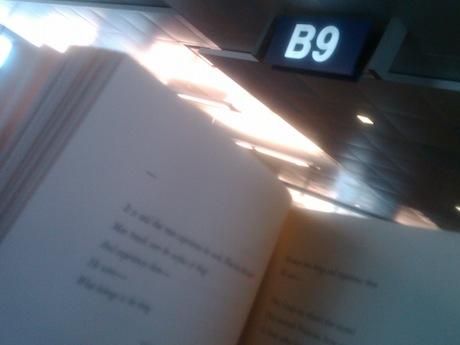Is three, or I guess four. I’m thinking of three people approaching a lake. The poems are more like movements than poems. I guess when I say movements I mean a kind of wash of meaning. But not solid like prose – as I like to say going from the west coast to the east coast of the page. Not broken up like poetry or like the prose part of poetry: the epigraph, the skinny blocks of italicized steals, the pastiche. Also the lists which are kind of the poems of prose in a standard book. So this is a wall of poetry made out of, I think, the poetic parts of prose. There’s tons of information in this book, which I like. I like a good quote which - was it Auden who said you judge a review by the quality of its quotations. Is a poem a success by this same standard. I’m thinking we are living in a poetic age Auden couldn’t or wouldn’t have wanted to imagine. I am actually a huge Auden fan but he was entirely a prig. I’ve never used that word before and I’m glad to do here. So a great quote from Benjamin, a list of jobs someone might have had and the hourly or daily rate they received for their labor – all these things shift together on Anna Moschavakis’s page. I think of prose poems for a moment too here. I’m appreciative that Baudelaire invented them AND did them so well but mostly a prose poem is a blah thing. I’ve heard a poet critic refer to a poem that probably didn’t please him in terms of its metrical performance – the actual poem was gentler and looser than that, but still a poem. And a good one at that. But the poet critic called it a prose poem and I thought is that a veiled way of him saying that simply isn’t a poem. A prose poem being a dumping ground instead. I am on unstable ground to be bringing all this up in reference to Anna’s work and yet I am here and mean to praise. In her hands the prose poem is pulled apart, left full of holes. I spoke with her at a reading one night and I told her how much I liked these poems. Why, she gleamed. I thought is that about me. A certain poet that I am surprises her in liking these? Why did I feel so complicit in her question to me. Her poem is of an unclear genre, though it is clearly a poem. It feels poem though it scrambles around the page, proclaiming and organizing itself quietly in an emphatic and softly authoritative and questioning voice. I liked that. I liked her subjects – labor, social questions, technology and the possibility of constructing humans, and of course gender. Questions of gender are all over the place. And I’ll end there. I was talking with my friends Sam and Amrit last night in Tucson. We said that a woman’s self was full of holes. In the case of a man the whole culture is busily at the task of completing him, making him whole. Propping up his masculinity. Its everyone’s job, apparently. I love Anna’s poems because she deploys the holes of womanness to talk of a wide panorama of things, the work it took to make these poems, mainly.
Eileen Myles was born in Cambridge, Massachusetts, and was educated at the University of Massachusetts…
Read Full Biography


